 |
|||
 |
|||
| SIPRI Update: Global Security & Arms Control | |||
|
|||
SIPRI at 50—A Year of Reflection on Peace and Security:
|
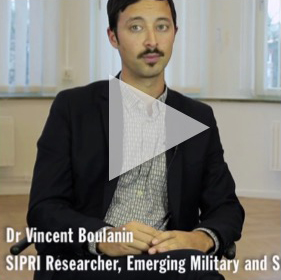 |
The state of peace operations:
|
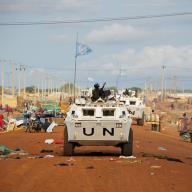 |
How can civil society contribute to peace in Mali?
Civil society mobilized quickly in Mali after the 2012 crisis, organizing protests in the capital city of Bamako and ensuring that medical supplies reached the conflict-affected regions. SIPRI and its Malian partner CONASCIPAL have launched a new project in Mali to further support civil society on the road to sustainable peace. |
 |
SIPRI Yearbooks launch across ChinaSIPRI Yearbook 2016 and the Chinese translation of SIPRI Yearbook 2015 were launched at 18 universities and research centres across China. Lora Saalman, Director of the SIPRI China and Global Security Programme, travelled to Beijing, Changchun, Hangzhou and Shanghai to present the Yearbooks to Chinese researchers. While there, she also participated in roundtable discussions on cyberspace and cybersecurity. Read more information and see photos on the SIPRI website. |
SIPRI releases new military expenditure data covering 1949–2015
SIPRI is proud to announce the online release of its extended military expenditure data. Previously, the SIPRI Military Expenditure Database covered the period 1988–2015; the extended military expenditure data goes back in most cases at least to the 1960s, and in some cases to 1949. |
 |
The US President-elect and military spending since the 1950s—see what’s new on SIPRI’s blog WritePeaceSIPRI's military spending data goes back in time! Read all earlier WritePeace blog contributions. |
 |
| UPCOMING EVENTS |  |
SIPRI will round off its 50th anniversary year—SIPRI's Year of Reflection—with several events in December.
For more information, please contact SIPRI Director of Communications, Stephanie Blenckner. 5—6 December 2016, Peace Palace, The Hague For more details, see the Planetary Security Conference website and read about the Working Group. |
|
| RECENT EVENTS |  |
| 16 November 2016, SIPRI, Stockholm Impact evaluations in fragile states In this full-day event, SIPRI brought together diverse groups of researchers, evaluators and implementers of development and peacebuilding programmes to discuss and share knowledge on impact evaluation practices, research methodologies and experiences in policy influence with regard to fragile states. For more information, visit the SIPRI website.
26—27 October 2016, Bogota, Colombia For more information, visit the SIPRI website or contact Mark Bromley or Alfredo Malaret from SIPRI's Dual-use and Arms Trade Control Programme. |
|
| SIPRI IN THE MEDIA |  |
| SIPRI's official statement on the 2016 Nobel Peace Prize winner was quoted in over 200 media outlets following the announcement. Contact Stephanie Blenckner, SIPRI's Director of Communications, for further information.
>>Dan Smith’s blog post on the outcome of the US presidential election was republished by the Swedish online magazine Mänsklig Säkerhet and New Internationalist. >>SIPRI’s Yearbook launch in Shanghai and the address by Lora Saalman were reported on in the Global Times. >>Aude Fleurant commented to Neue Zürcher Zeitung on the reactions of the arms industry to the US presidential election. >>Pieter Wezeman talked to Radio Sweden about Swedish arms exports. |
|
| RECENT PUBLICATION |  |
Special Treatment: UK Government Support for the Arms Industry and TradeSIPRI and Campaign Against Arms Trade (CAAT) issued a report by Dr Sam Perlo-Freeman. The British arms industry and market, as in most other significant Western arms-producing countries, has a unique status. Although its production capabilities are privately owned, it has the national government as its primary customer. Unlike other industries, it is often the subject of active government industrial policy. This report begins by providing an overall quantitative picture of the UK arms industry, followed by a brief overview of previous studies that have looked at subsidies to arms exports. It assesses and estimates the level of direct support to arms exports—that is, the identifiable subsidies that relate specifically to exports—while also discussing the place of exports in the broader government support to the arms industry. In particular, the report looks at funding for military research and development, as well as the extent to which this can be considered to include a direct or indirect subsidy to arms exports. Conversely, the report also considers the question of whether arms exports may save the British Government money through lower unit costs for its own procurement. |
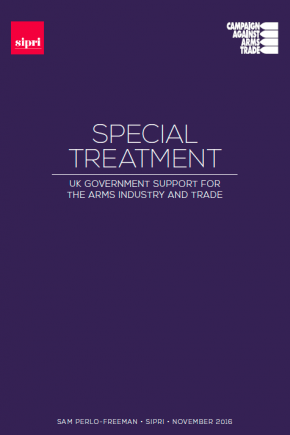 |
| RECENT PUBLICATION |  |
Increasing Transparency in Biodefence: A 2016 Visit to a German Military Medical Biodefence Facility
SIPRI published EU Non-proliferation Paper no. 52 by Dr Filippa Lentzos. States with biodefence programmes have a special responsibility to ensure high standards of transparency. Most submit declarations about their programmes under the confidence-building measures (CBMs) of the 1972 Biological and Toxin Weapons Convention (BWC). Some states have recently gone further in their voluntary efforts through interactive information exchanges and on-site visits. In 2016 Germany invited BWC states parties to visit its main military medical biodefence facility to evaluate its compliance with BWC obligations. During the visit, Germany described its biodefence activities and the related laws, regulations and practices that are in place to ensure that the activities are carried out safely, securely, responsibly and in line with the requirements of the BWC. This paper details the two-day exercise from the perspective of the author, a civil society observer invited to take part alongside the 20 state party representatives. |
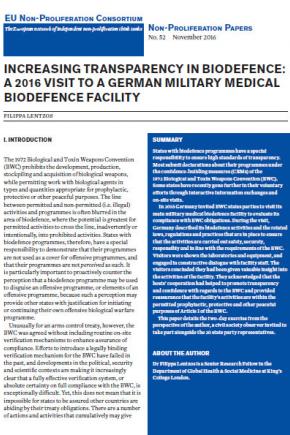 |
| RECENT PUBLICATION |  |
The Implications of the Ukraine Conflict for National Nuclear Security PolicySIPRI published EU Non-proliferation Paper no. 53 by Dmytro Chumak. Since the annexation of Crimea by Russia and the outbreak of armed conflict in the eastern part of Ukraine, development of the Ukrainian Government’s nuclear security policy has sought to strengthen the protection of civilian nuclear facilities, materials and sources inside the country from emerging threats arising from the changed security environment. This paper reviews the nuclear security situation in Ukraine as influenced by the ongoing conflict in the country. It looks at the current state of affairs in the Ukrainian nuclear industry through the prism of nuclear security conditions. Emerging threats are considered based on three main groups: (a) classic nuclear security threats; (b) threats from occupied/uncontrolled territories; and (c) ‘hybrid war’ threats. Successfully implemented measures aimed at improved nuclear security under such circumstances would ensure safe and secure operation of nuclear facilities and strengthen their resistance to attacks by terrorists and organized crime groups, as well as prevent illicit trafficking and malicious use of uncontrolled nuclear materials and sources. |
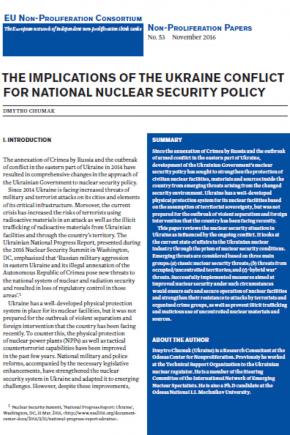 |
| FEATURED PUBLICATION |  |
SIPRI Yearbook 2016
The 47th edition of the SIPRI Yearbook is a compendium of data and analysis in the areas of security and conflicts; military spending and armaments; and non-proliferation, arms control and disarmament. It covers developments during 2015, including:
Download a summary of SIPRI Yearbook 2016. |
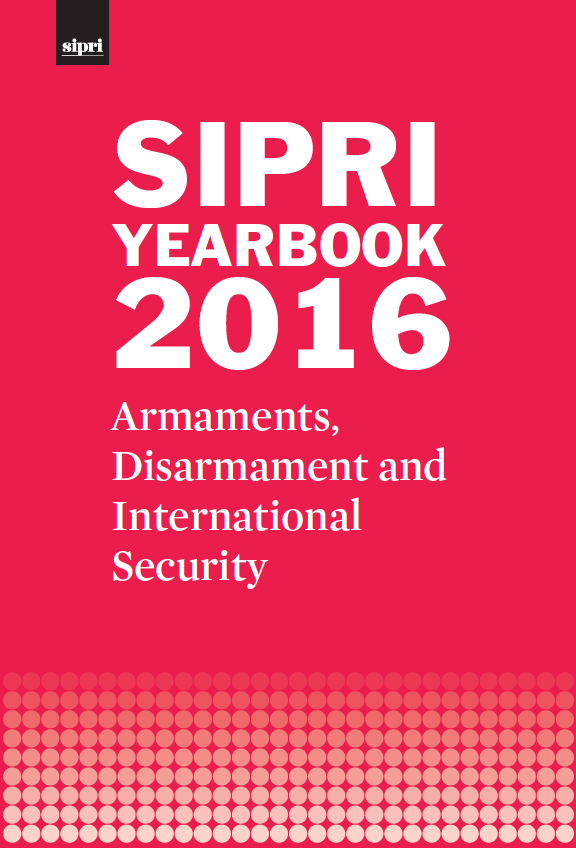 |
| © SIPRI 2016. ISSN 1654-8264. Contact SIPRI by email: sipri@sipri.org; telephone: +46 8 655 97 00; or post: SIPRI, Signalistgatan 9, SE-169 72 Solna, Sweden. Visit us online at www.sipri.org. |